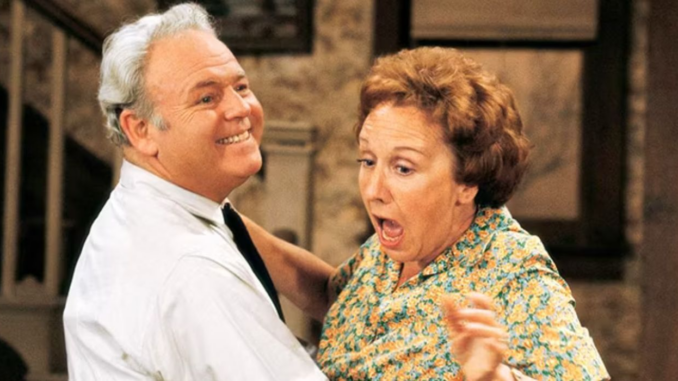
In the world of television sitcoms, few have made as much of an impact as All in the Family. Premiering in 1971, this groundbreaking series quickly became the talk of America for its unapologetic portrayal of controversial social issues. From racism to sexism, political disagreements, and beyond, All in the Family tackled topics that most shows wouldn’t dare touch. It was not just a comedy; it was a social commentary, reflecting the harsh realities of society in a way no sitcom had ever done before.
A Bold Reflection of Society
At the heart of All in the Family was its star, Carroll O’Connor, who played the infamous Archie Bunker. Archie was the working-class, bigoted father of the Bunker family, and his character became a symbol of conservative America’s struggles with the rapidly changing social landscape of the 1960s and 1970s. His character wasn’t just a relic of the past; he was a mirror reflecting the prejudices and fears of many viewers at the time.
The brilliance of All in the Family was its ability to make audiences laugh while simultaneously challenging them to reflect on their own beliefs. Archie’s constant rants about “colored people” and his blatant disregard for progressive ideas were not just meant to offend—they were designed to expose the deep-rooted biases in American society.
The Impact of All in the Family‘s Social Commentary
One of the key reasons why All in the Family remains controversial to this day is its fearless approach to addressing issues that were, and still are, deeply divisive. The show tackled racism, homosexuality, women’s rights, and political correctness long before these topics became common in mainstream media.
In one of the most iconic episodes, Archie finds himself confronted by his liberal son-in-law, Mike “Meathead,” who challenges his outdated views on everything from war to civil rights. This clash of ideologies between Archie and Mike wasn’t just a plot device—it reflected the broader generational divide in American culture at the time.
Perhaps the most groundbreaking aspect of All in the Family was how it used humor to expose uncomfortable truths. For example, the show’s portrayal of racist attitudes was never intended to condone them; instead, it used Archie’s ignorance to highlight the absurdity of such views. The show’s writers didn’t shy away from making the audience confront difficult truths about bigotry and social inequality.
Archie Bunker as a Cultural Icon
While Archie Bunker was undoubtedly a controversial character, he also became a cultural icon. His character embodied the kind of working-class, middle-aged, white male who felt threatened by the cultural shifts happening around him. This made him a voice for many Americans who were uncomfortable with the rapidly changing social landscape of the late 20th century.
But what All in the Family did so brilliantly was show that Archie’s views, while popular, were also outdated and ultimately wrong. Through the character’s growth (or lack thereof), the show forced viewers to reckon with their own biases and prejudices. It made people laugh, yes, but it also made them think.
Conclusion
All in the Family wasn’t just a sitcom—it was a revolution in television. By tackling controversial issues with humor, the show broke boundaries and pushed the limits of what television could and should be. Its unapologetic critique of American society made it the most controversial sitcom of its time, and its impact can still be felt in television today. Archie Bunker may be a relic of a bygone era, but the issues All in the Family raised are just as relevant now as they were over 50 years ago.
